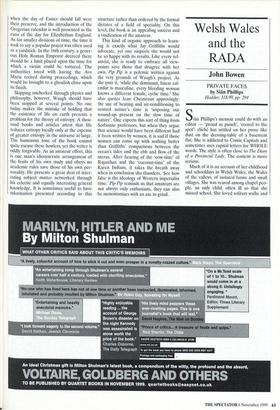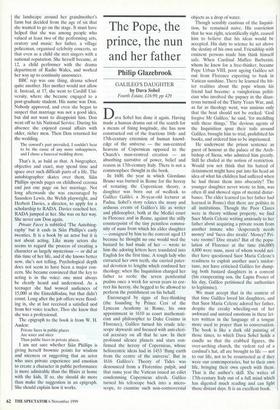Welsh Wales and the RADA
John Bowen
PRIVATE FACES by Sign Phillips Hodder, 318.99, pp. 294
Sian Phillips's memoir could do with an editor — 'proud as punch', 'rooted to the spot': cliche has settled on her prose like dust on the dressing-table of a basement flat. She is addicted to Comic Capitals and sometimes uses capital letters for WHOLE words. The style is often close to The Diary of a Provincial Lady. The content is more serious.
Much of it is an account of her childhood and schooldays in Welsh Wales, the Wales of the valleys, of isolated farms and small villages. She was reared among chapel peo- ple, an only child, often ill so that she missed school. She loved solitary walks and the landscape around her grandmother's farm but decided from the age of six that she wanted to go on the stage. It must have helped that she was among people who valued at least two of the performing arts, oratory and music: her father, a village policeman, organised celebrity concerts, so that even as a child she met singers with a national reputation. She herself became, at 12, a child performer with the drama department of Radio Wales, and worked her way up to continuity announcer.
BBC rep was one thing, drama school quite another. Her mother would not allow it. Instead, at 17, she went to Cardiff Uni- versity, where she became engaged to a post-graduate student. His name was Don. Nobody approved, and even she began to suspect that marriage was not a good idea, but did not want to disappoint him. Don went off to his National Service. During his absence she enjoyed casual affairs with older, richer men. Then Don returned for the wedding.
The coward's part prevailed, I couldn't bear to be the cause of any more unhappiness, and I chose a funereal wedding dress.
That's it, as bald as that. A biographer, objective and exact, may spend time and space over such difficult parts of a life. The autobiographer skates over them. Sian Phillips spends pages on childhood eczema and just one page on her marriage. Not long afterwards she was encouraged by Saunders Lewis, the Welsh playwright, and Herbert Davies, a director, to apply for a scholarship to RADA. Davies coached her. RADA jumped at her. She was on her way. She never saw Don again.
Private Faces is subtitled 'The Autobiog- raphy' but it ends in Sian Phillips's early twenties. It is a book by an actor but it is not about acting. Like many actors she seems to regard the process of creating a character as largely mysterious — or did at this time of her life, and if she knows better now, she's not telling. Psychological depth does not seem to have been a major con- cern. She became convinced that the key to acting is in the voice: one must always be clearly heard and understood. As a teenager she had wowed audiences of 15,000 at the Eisteddfodau, but that didn't count. Long after the job offers were flood- ing in, she at last received a satisfied nod from her voice teacher. Then she knew that she was a professional.
The epigraph to the book is from W. H. Auden:
Private faces in public places Are wiser and nicer Than public faces in private places.
I am not sure whether Sian Phillips is giving herself brownie points for wisdom and niceness or suggesting that an actor who uses private experience and emotion to create a character in public performance is more admirable than the Blairs at home with the kids. If so, she should do more than make the suggestion in an epigraph. She should explain how it works.



























































































 Previous page
Previous page